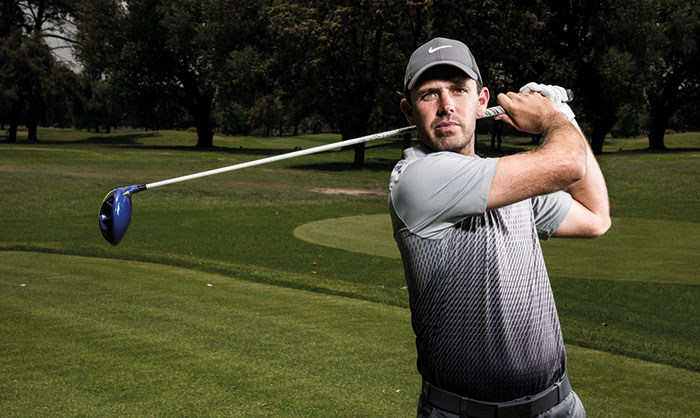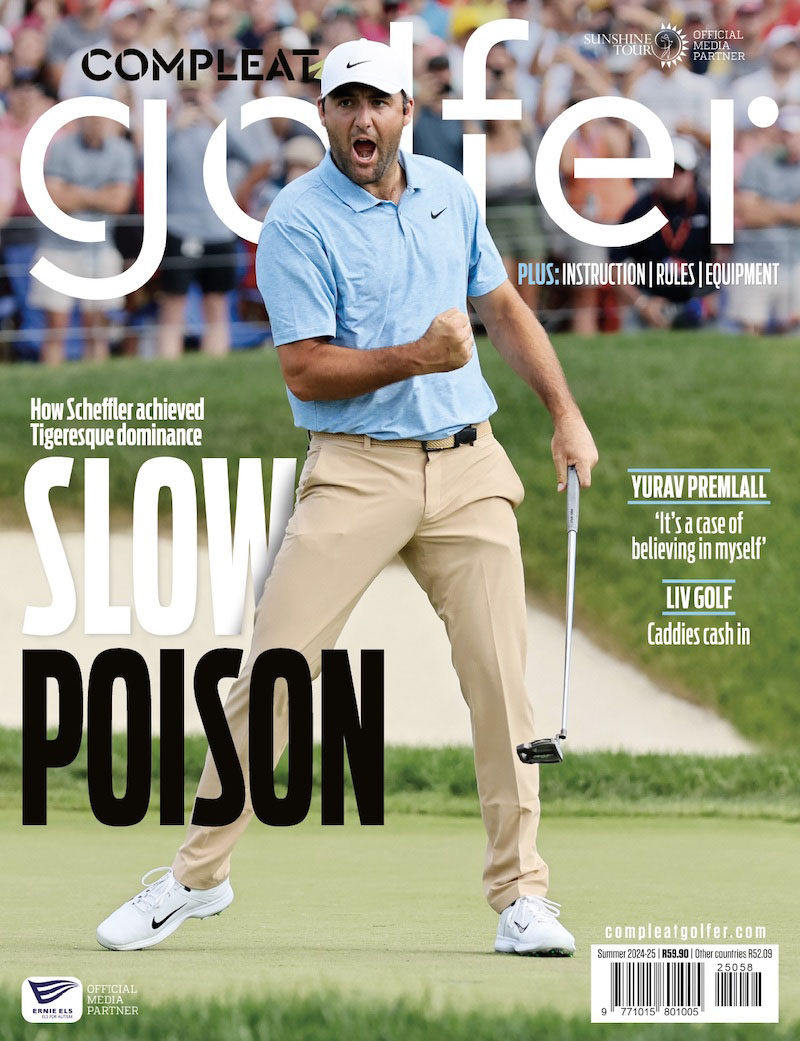Charl Schwartzel is happy. He’s not smiling for the TV cameras when he plays, as his critics would like him to do more of. That’s not going to happen, so get over it people. He’s not fist-pumping his way around 18 holes. Never will. But he is deeply happy. At the age of 31 and revelling in marriage and fatherhood, the former Masters champion is as comfortable as he’s ever been in his own skin. And from this, he feels, will come a new kind of magic, writes Michael Vlismas.
‘I love the feeling that’s going on inside me. It’s a very positive vibe. I’ve just got a great feeling for this year, whatever it brings,’ says Schwartzel.
That’s because in his mind he’s 13 again, when golf was pure passion for a man who grew up on a farm in Maccauvlei and who is defined by the freedom of that experience.
‘I was about four years old when we moved to the farm. If you consider I was married at 26, that’s 22 years of my life that was spent on the farm. I wouldn’t substitute that for anything. The freedom I had as a child was unbelievable. I was in primary school and I was already driving big tractors and harvesters. I couldn’t wait to get back from school and work on the farm.’
This experience has created a depth to Schwartzel that is far more impressive than a forced smile to a television camera. It would be a mistake to label him as just another Afrikaans farm boy, but the effect of the open veld on his psyche is clear when you consider how many of South Africa’s top young golfers are Afrikaans and had similar childhoods – Louis Oosthuizen and Branden Grace among them.
‘We had such vast space there. I remember I could hit driver in the garden from one side to the other. As time progressed I started hitting driver over the garden fence. Today it’s just a sand wedge for me.’
From the age of four golf was very much a natural part of Schwartzel’s life. His father George used to compete on the Sunshine Tour and gave him the technical skills. His mother Lizette, a Van Niekerk, gave him peace. ‘She’s the one I learned a lot from regarding temper. She’s very calm and doesn’t get too uptight under pressure. I think I’ve got a good combination of a bit of fire and that calmness under pressure from my parents.’
There have been other inspirations too. ‘Ernie Els helped me so much when I just arrived in America. To be around somebody who has been my hero is very special. And Nick Price and I have become great friends. I spend more time with him than anybody. The advice he gives and his experience is phenomenal.’
Even his brother Attie, formerly a touring professional and now Schwartzel’s caddie, is a source of inspiration.
‘Things are just falling into place. We’re getting to the age where we’re becoming good friends. He’s matured a lot. He’s gone through his ups and downs in the game and understands it. He’s had a lot of heartache. He understands me well. He’s a very relaxed guy. I’ve never had somebody so relaxed on my bag as when I won the Alfred Dunhill Championship last year. It’s nice to have that presence around you on the big stage because it gets very lonely inside the ropes.’
Schwartzel played his first nine holes at Polokwane Golf Club (where Retief Goosen learnt the game). But it was at Maccauvlei Golf Club where he really developed. His family lived 15 minutes from the course on the banks of the Vaal River, which has always been welcoming of junior golfers.
‘I used to caddie for my dad and would hit a few shots during his round. Maccauvlei was always tolerant of us as juniors, which some clubs aren’t. My dad was a good golfer and I was so lucky he was knowledgeable about the game. He taught me the right basics from the beginning and that helped me in my career. If you start the wrong way it’s very difficult to change in this game.’
But at the heart of it all was an unshakeable passion to just play this game for the love of it. And it’s something Schwartzel believes he’s only now beginning to feel again.
‘I just wanted to play. In primary school I was a good student and I played all sports and was pretty good at them. Things changed a bit when I went to high school. I realised I wasn’t as fast as I should be for athletics and as strong as I should be for rugby. And golf kept standing out. That’s when I realised it was what I was going to do. I wanted to work at it.
‘I played my first junior tournament at the age of 10. I was first off on the 10th tee and progressively I got myself to being last off on the first tee. You just get better and better. I started winning tournaments and in a way it felt like a natural course of things. I was lucky that I wasn’t forced into it. I always wanted to do it. A lot of parents make that mistake and I see so many kids lose their hunger and enjoyment for the game. I would always be begging my dad to take me to go to the golf course.’
His humility prevents him from overplaying any particular incident that made him realise he was destined for greatness in this game. But there was one moment he still remembers to this day.
‘Look, I was very shy as a youngster. I was never really outspoken about being great or anything like that. I just carried on playing. But I remember playing the North versus South at Rondebosch Golf Club. I think I was 13. I played against Louis Oosthuizen. I shot 65 to beat him. I made every putt I looked at. Even today he and I talk and laugh about it. That was quite special.’
The feeling Schwartzel tried to rediscover through some of the bad years he went through after winning The Masters in 2011 came when he was 13 and went overseas for the first time to play in the Jack Newton Invitational in Australia.
He played his round in the morning. Then, with time on his hands, he went out in the afternoon and caddied for local golfer Andrew Buckle. ‘He was better than Steven Bowditch at the time, and he won that tournament,’ says Schwartzel. But it was that act of playing golf in the morning and then being so in love with the game he went out and caddied in the afternoon that still stuns Schwartzel to this day.
‘I just loved the game and did it for what it was. I just played the game and wasn’t even conscious of what I was achieving. I became South Africa’s No 1 amateur but didn’t think anything of it. If you start over-analysing things and making them too important, you create an illusion in your head that stops you from achieving whatever you want to.
‘Even Jack Nicklaus says he never knew how important Majors were. He just played them and won. But the media make these things so big. They make it so big you just think about that and not the pure act of playing.’
And that’s what happened after the 2011 Masters. Schwartzel was at the top of his game with a victory hailed as one of the finest in the Major’s history. And then the bottom dropped out, and that 13-year-old boy suddenly forgot why he loved this game so much.
‘I knew I was good enough to win The Masters, but when it actually happened, there was no one more surprised than me. Suddenly you go from being a European Tour winner to winning the biggest tournament in golf and the hype around it was massive. For the first bit you’re riding such a wave of confidence you’re almost just playing with confidence because you’re the Masters champion. But when it started going bad I didn’t have the experience to deal with it. You think you can’t be playing this badly because you’ve won the biggest tournament in the world. What’s wrong with you? It spiralled the wrong way, and two years later I didn’t like who I was. When expectations are high and you’re not achieving things, the fire in you turns the wrong way and you’re getting in the way of yourself.’
That’s when people start asking why you don’t smile on the golf course. Or whispers abound about family and relationship issues. Judgements are made. And yet it’s all quite simple and so inconceivably hard at the same time – a boy is just trying to fall in love with the game again, under the biggest microscope in sport.
‘I’ve learned a hell of a lot and I know I’m more ready now if it happens again. And I believe I will win another Major. But when I do I’ll be much more prepared. Those bad years were almost a way of making me realise, “Hey, get back to who you were. That guy who caddied in a tournament because you liked the game and instead of forcing it.”’
‘It takes time to deal with things. Where I’m sitting today to a few years back, I’m feeling more like when I was 13 years old and I love the feeling. The game excites me again. The challenges it brings. There is still some really good golf to come. The way I feel now, nothing can throw me off course. I feel I can compete with the best player in the world.’
His wife Rosalind and daughter Olivia play a huge part in where Schwartzel finds himself mentally.
‘Olivia is the best thing that happened to me. She’s played a big role in making me realise what life is about. And Rosalind is so solid in my life. She’s really strong. The life we lead as golfers is selfish. It’s all about you. Unfortunately it should be like that. Most things revolve around the golfer and it’s hard for a wife. Rosalind is strong. She adapts well, can take care of herself, be on her own, and never gives me a hard time when I’m playing or practising. She believes in me more than I believe in myself.’
So deal with the smile, people, because that’s not who Charl Schwartzel is. ‘People get a great misconception when we play. People like to see you smile and be all jolly. I also want to be like that. But you play under constant pressure and to support your family, and one shot means a lot. So you can’t be out there clowning around. People are different and you develop a way to deal with it. Some put on a smile and that’s how they deal with pressure. Others have to be more within themselves. With the cameras in your face, they can catch you at the wrong time and people get the wrong perception of you.’
Charl Schwartzel is the golfer who years back took a break from the game, went into the Namibian desert and went searching again for that 13-year-old boy.
He walked into a little hardware store, bought a piece of carpet off-cut, and hit balls into the dunes. Alone. For hours. Because he loved it. Then he came back and won the Alfred Dunhill Championship at Leopard Creek.
‘Those things define you. That’s who I am. I just stood there by myself and hit balls because I wanted to.’
Charl Schwartzel is still that kid who played chipping games in his garden on the farm – chipping over trees, the house, into cereal bowls.
‘It feels like yesterday because I can remember it like yesterday. I really enjoy what I do. If I pace myself correctly and am not overplaying, I can keep myself hungry.’
And it will always be to the quiet space within himself that Schwartzel will retreat and from which he will draw the greatest strength.
‘I really miss growing up on the farm. I’m an introvert. And on the farm, to this day, I go out by myself and I sit there, and there’s just no-one there and that feeling of the freedom and quietness is something I really miss when I’m away. You’re in the spotlight the whole time and the life we lead is sometimes very fake and money-orientated, and you’re around a lot of fake people. But on the farm it’s just nature and there’s nothing fake about it. It’s just good for the soul.’








